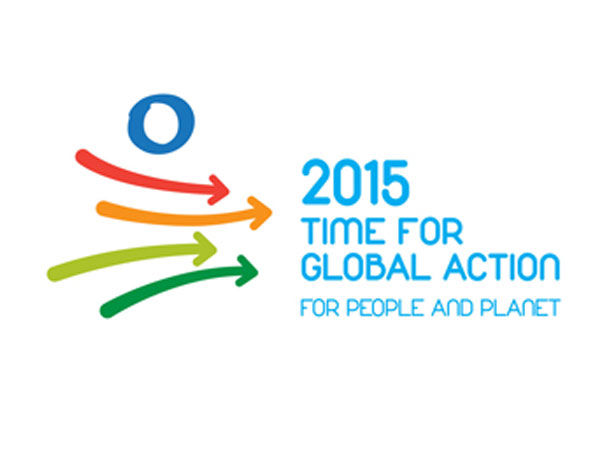In an informal briefing to the 193-Member Assembly, the UN Secretary-General Ban Ki-moon today presented the United Nations General Assembly with an advance version of his “synthesis report,” which will guide negotiations for a new global agenda centred on people and the planet, and underpinned by human rights. He presented his synthesis report, The Road to Dignity by 2030: Ending Poverty, Transforming All Lives and Protecting the Planet. The President of the General Assembly, Sam Kutesa also addressed delegates, describing the process of intergovernmental negotiations that fed into the report’s compilation to set the stage for agreement on the new framework at a September 2015 summit. The synthesis report presented dignity, people, prosperity, the planet, justice and partnerships as an integrated set of “essential elements” aimed at providing conceptual guidance during discussions of the goals and the SG stressed that none could be considered in isolation from the others and that each was an integral part of the whole.
In the report’s conclusion, the Secretary-General issues a powerful charge to Member States, saying: “We are on the threshold of the most important year of development since the founding of the United Nations itself. We have an historic opportunity and duty to act, boldly, vigorously and expeditiously, to turn reality into a life of dignity for all, leaving no one behind.” He underlined that that his synthesis report “looks ahead, and discusses the contours of a universal and transformative agenda that places people and planet at the centre,” The synthesis report aims to support States’ discussions going forward, taking stock of the negotiations on the post-2015 agenda and reviewing lessons from pursuit of the MDGs.
He also welcomed the outcome produced by the Open Working Group, saying its 17 proposed sustainable development goals and 169 associated targets clearly expressed an agenda aiming at ending poverty, achieving shared prosperity, protecting the planet and leaving no one behind. Discussions of the Working Group had been inclusive and productive and the Group’s proposal should form the basis of the new goals, as agreed by the General Assembly.
The coming months would see agreement on the final parameters of the post-2015 agenda and he stressed the need for inclusion of a compelling and principled narrative, based on human rights and dignity. Financing and other means of implementation would also be essential and he called for strong, inclusive public mechanisms for reporting, monitoring progress, learning lessons, and ensuring shared responsibility. Implementation would also rely on bridging the technology gap, creating a new framework for shared accountability, and providing reliable data, which he called the “lifeblood of sound decision-making.”
Stressing his commitment to ensuring the best outcome from the post-2015 process, he underlined the need for member states to be guided by universal human rights and international norms, while remaining responsive to different needs and contexts in different countries.

By bnnrc
AHM Bazlur Rahman-S21BR is Chief Executive Officer and founder Secretary of Bangladesh NGOs Network for Radio and Communication (BNNRC). He has more than 20 years experience in leveraging community media and right to communication to create successful policy advocacy in Bangladesh in line with community media development. His areas of expertise straddle community media policy advocacy, training, project management especially in the area of community media.
He founded Bangladesh NGOs Network for Radio and Communication (BNNRC). BNNRC Devoted Entirely to Promote Community Media for Development (CM4D). BNNRC Leads Supports and Advocates for the Initiators to actively provide independent community broadcasting in Bangladesh since 2000. BNNRC represent the community electronic media sector to Government, Industry, Regulatory Bodies, Media, Academia and Development Partners from 2000. The BNNRC provides leadership and support for rural initiators to facilitate independent electronic community broadcasting services and to build and strengthen rural communities.
He actively works to improve recognition of the community electronic media sector [Community Radio | Community TV | Community Film] & its work in and involvement with the communities it seeks to serve. BNNRC's outreach extends to local, national and international forums for communicating Knowledge for Development (KM4D). In this backdrop, communication is recognized as an essential human need and, therefore, as a basic human right. Our working strategies are:
1. Communicating on the Public Sphere: The role of communication and media in exercising democratic political participation in society
2. Communicating Knowledge: The terms and means by which knowledge generated by society is communicated, or blocked, for use by different groups.
3. Civil Rights in Communication: The exercise of civil rights relating to the processes of communication in society &
4. Cultural Rights in Communication: The communication of diverse cultures, cultural forms and identities at the individual and social levels.
BNNRC now strives for the following core interventions to contribute in achieving 6th five Years Plan, UN World Summit on the Information Society (UN WSIS) Action Plan and Millennium Development Goals (MDGs) through:
Right to Information- RTI for ensuring improved livelihood of the marginalized
ICT for Development- ICT4D for Bridging the Digital Divide in rural areas &
Community Radio/Community TV/ Community Film for amplifying voices for the voiceless and Amateur Radio for Disaster Risk Reduction
He graduated from University of Dhaka and Post graduated from Asian University of Bangladesh in the field of Social Science (MSS) in Government & Politics and Participated in certificate course on Development Management by Participatory Research in Asia (PRIA) New Delhi, India
He currently founder member of Bangladesh Working Group on UN World Summit on the Information Society (UN WSIS) headed by Bangladesh Government, Community Radio Monitoring Committee of Ministry of Information, People’s Republic of Bangladesh, founder member of Bangladesh UN Internet Governance Forum( UN IGF) Headed by Minister, Ministry of Information, Multi-stakeholder Steering Group Members of Asia Pacific Regional Internet Governance Forum (AP-RIGF) & Distinguish Fellow, Center for e-Parliament Research. Contact: ceo@bnnrc.net www.bnnrc.net
View all of bnnrc's posts.
